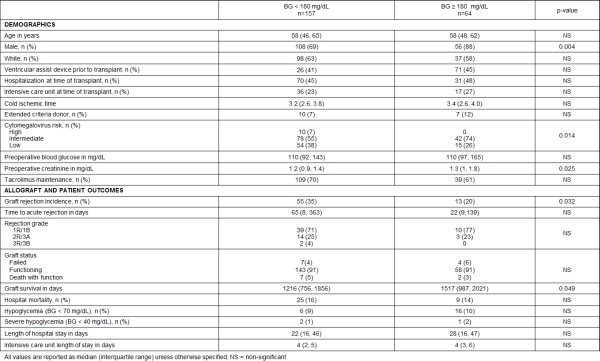Assessment of Postoperative Glycemic Control in Orthotopic Heart Transplant Recipients.
NewYork-Presbyterian Hospital, Columbia University, New York.
Meeting: 2016 American Transplant Congress
Abstract number: B161
Keywords: Graft survival, Heart transplant patients, Outcome, Rejection
Session Information
Session Name: Poster Session B: Hearts and VADs in Depth - The Force Awakens
Session Type: Poster Session
Date: Sunday, June 12, 2016
Session Time: 6:00pm-7:00pm
 Presentation Time: 6:00pm-7:00pm
Presentation Time: 6:00pm-7:00pm
Location: Halls C&D
Hyperglycemia may occur after solid organ transplantation because of stress, immunosuppressants, and diabetes mellitus. Glycemic control has been shown to decrease morbidity and mortality in cardiothoracic patients. Little is known about the impact of postoperative glycemic control on clinical outcomes following orthotopic heart transplantation (OHT). The objective is to determine how postoperative glycemic control affects allograft and patient outcomes following OHT.
Methods: Retrospective study of adult OHT recipients transplanted between 10/1/07-12/31/13. Recipients were included if they received IL-2 induction and had at least 1 blood glucose value within 24hrs of transplant and excluded if they had a prior OHT or panel reactive antibody >30%. Patients were classified into two groups by the median 24hr blood glucose (hyperglycemia >180mg/dL; normoglycemia ≤180mg/dL). The primary outcome was development of acute cellular rejection (ACR). Secondary outcomes included ACR severity, time to ACR, retransplantation, death, primary graft failure, and hospital and intensive care unit (ICU) length of stay.
Results: Demographic characteristics for the included 221 recipients were similar between groups, with the exception of a significantly more males and higher preoperative serum creatinine in the hyperglycemia group. Patients in the normoglycemic group had a higher CMV risk. The incidence and severity of graft rejection was higher in the normoglycemic group (p < 0.05). Although graft survival rates were similar between groups, duration of graft survival was significantly shorter in the normoglycemic group (p < 0.05). There was no difference in rates of hypoglycemia or patient outcomes including length of hospital or ICU stay or hospital mortality.
Conclusion: Shorter duration of allograft survival, increased incidence of acute rejection, and greater severity of rejection occurred in the normoglycemic group. These outcomes were noted despite similar rates of hypoglycemia, thus indicating that aggressive glycemic control in the immediate postoperative period may not be necessary.
CITATION INFORMATION: Glick Frasiolas J, Matthew J, Tsapepas D. Assessment of Postoperative Glycemic Control in Orthotopic Heart Transplant Recipients. Am J Transplant. 2016;16 (suppl 3).
To cite this abstract in AMA style:
Frasiolas JGlick, Matthew J, Tsapepas D. Assessment of Postoperative Glycemic Control in Orthotopic Heart Transplant Recipients. [abstract]. Am J Transplant. 2016; 16 (suppl 3). https://atcmeetingabstracts.com/abstract/assessment-of-postoperative-glycemic-control-in-orthotopic-heart-transplant-recipients/. Accessed January 4, 2026.« Back to 2016 American Transplant Congress
